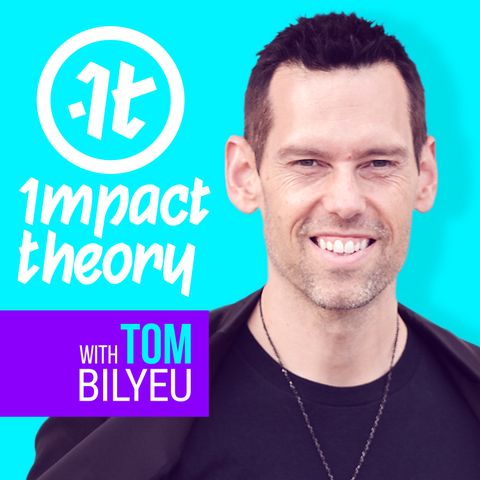This Scientist Breaks Down the PROBLEM with SCIENCE and How to FIX IT | Brian Keating

Download and listen anywhere
Download your favorite episodes and enjoy them, wherever you are! Sign up or log in now to access offline listening.
Description
Check out our sponsors: http://riverside.fm/impact LMNT: Go to drinkLMNT.com/Impact Shopify: Go to shopify.com/impact Skillshare: skillshare.com/impacttheory for a 1 month FREE trial of Premium Membership. CompetitiveCyclist: Get FIFTEEN PERCENT OFF plus...
show morehttp://riverside.fm/impact
LMNT: Go to drinkLMNT.com/Impact
Shopify: Go to shopify.com/impact
Skillshare: skillshare.com/impacttheory for a 1 month FREE trial of Premium Membership.
CompetitiveCyclist: Get FIFTEEN PERCENT OFF plus FREE SHIPPING at CompetitiveCyclist.com/IMPACT and enter promo code IMPACT.
Athletic Greens: Go to athleticgreens.com/impact and receive a FREE 1 year supply of Vitamin D AND 5 free travel packs with your first purchase!
What does it mean to go “into the impossible”?
For Professor of Cosmology Dr. Brian Keating, it’s all about shattering the limiting beliefs around what a human being is capable of.
In his latest book, Into the Impossible: Think Like a Nobel Prize Winner, Dr. Keating explores this question through the lens of the pursuit of one of humanity’s highest achievements: The Nobel Prize.
Today’s episode is a wide-ranging conversation that touches on everything from the scientific method and first principles thinking, to the motivations that drive people to pursue the highest level of achievement.
Find out more by ordering Dr. Keating’s book here: https://amzn.to/3p3AKeT
SHOW NOTES:
00:00 | Introduction
01:13 | The Power of The Scientific Method
11:41 | What is Truth, and Why Does it Matter?
18:17 | The Scientific Method: Inductive vs. Deductive
29:31 | Brian’s Origin Story
39:11 | Losing the Nobel Prize
47:47 | What Drove Brian to Aim At a Nobel Prize
1:00:46 | Brian’s Quest Takes a Turn For The Worse
1:09:53 | Into the Impossible: Behind the Title
1:20:01 | Disproportionate Returns & The Curse of Knowledge
1:29:48 | The Key to Pursuing Something Grand
1:32:59 | Scientific Pursuit, Happiness, & Fulfillment
1:50:14 | The Epistemic Approach to Problem-Solving
QUOTES:
“Oftentimes, scientists are like kids. Kids are curious, they're inquisitive, they can be charming, they can be mischievous. They can also be jealous, they can be petty, they can not want to play.” [05:26]
“Truth is what anchors us to reality. If you and I have different versions of reality - of relative truth - I think chaos ensues from that.” [05:43]
“What the scientific method does, is it doesn't say ‘That's right.’ It says, ‘That's not wrong.’” [08:47]
“Energy by itself is meaningless. It's almost nothing. But organized energy can do anything. And that's the core principle - that you need organization. Organization implies order.” [14:16]
“Passion is like a spark that can ignite the afterburner, but you need the fuel to keep the afterburner going. And curiosity is that fuel.” [38:22]
“In science, using the scientific method, there should be a little bit of add on, where you check to see, ‘Am I fooling myself?’” [1:06:32]
“Oftentimes people short the human intellect and what we're capable of doing.” [1:12:05]
“I don't like this saying, ‘Follow the science.’ Science is supposed to be about questioning authority. And now we're in this land where you have to follow authority. I think almost nothing could be less scientific than saying ‘Oh, because this particular person like Feynman would say something, that I'm not going to question it.’ He has to be wrong, just as Newton was wrong, just as Galileo was wrong.” [1:15:50]
“Albert Einstein had imposter syndrome. He said that Isaac Newton did more, not only for physics, but for Western civilization, than any person before or since, even including Einstein himself.” [1:19:45]
“This is my meaning of life. I'm gonna do those things that which, if taken away from you, would devastate you.” [1:43:55]
“The great thing about science is you never ‘win’ science. There's no such thing as winning science. You might win a Nobel Prize or win tenure, or get into a good school. But you're not winning science, because it's an infinite game, it cannot be won. That's what's so magical about it.” [1:55:19]
Follow Dr. Brian Keating:
Website: briankeating.com/
Twitter: https://bit.ly/3E5Y9AE
Instagram: https://bit.ly/3GWYuYt
Order Dr. Keating’s new book, Into the Impossible: https://amzn.to/3p3AKeT
Information
| Author | Impact Theory |
| Organization | Geoffrey Freedman |
| Website | - |
| Tags |
Copyright 2024 - Spreaker Inc. an iHeartMedia Company

Comments